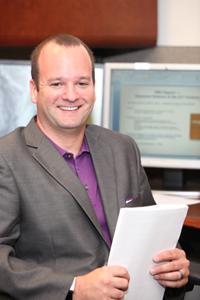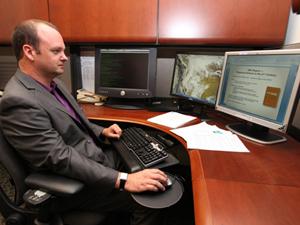Meet EPA Scientist Blake Schaeffer, Ph.D.

The Future of Water Quality Monitoring
EPA research ecologist Blake Schaeffer, Ph.D. focuses on developing ways to use satellite remote sensing technology to monitor water quality. His research interests broadly include deriving water quality parameters in coasts, estuaries, and lakes using satellites. He is currently developing a proposed satellite remote sensing approach to monitor Florida's coastal waters for numeric nutrient criteria in the State of Florida.
How does your science matter?
I am working to help protect water and public health. My research uses satellite remote sensing technology to monitor water quality. My colleagues and I are using an instrument on the International Space Station that can see beyond the usual spectrum of light perceptible to the human eye.
How does it work?
Imagine you’re looking at a lake. The water appears blue to you because your eyes are differentiating the color. The satellite does the same thing, but instead of seeing a few different colors, each physical material in the water reflects solar energy in a unique color. It shows chemical compounds and marine life in the water that are invisible to the human eye. We can take the images and use them with mathematical models we’ve developed to measure water quality.
This technology allows us to do much more than traditional techniques. We have the potential to view water quality on an enormous scale, such as the entire United States, but we can also zoom in to get specific real-time data for your local lake. That’s where the real impact with this technology comes in, because we’ll be able to notify people if there is a water quality issue.
It also gives us an historical archive of what has happened in the past. With satellite technology, you have the potential to go back 10 or 15 years into the archive and see how much things have changed and at what rate. That’s a huge advantage.
If you could have dinner with any scientist, past or present, who would you choose and what would you like to ask them?
If we're really being theoretical here, I'd like to have dinner with someone from the future, who's a scientist 100 to 200 years from now, to see what are the pressing issues. It would be interesting to see the differences from today. I'd like to know if what we're doing right now has connection and relevance in the distant future. That's what we're aiming for, doing something that improves the environment for future generations.

What do you like most about your research?
It's very captivating. When you think about the fact that's we're using space age technology for something so fundamental as measuring water quality, it's very innovative. I like pushing the boundaries of technology and being on the forefront of what's really possible.
When did you first know you wanted to be a scientist?
Inherently, I always knew my interests, even when I was little, fell along the lines of scientific thinking. I remember being on the docks where I lived and seeing the water, going fishing and crabbing, and wondering what was inside the crab and the fish.
Tell us about your background.
I started at a community college where I got an Associate's degree in biology. From there, I went to Albright College and got two Bachelors degrees, one in biology and one in biochemistry. Then, I went to North Carolina State University and got my Ph.D. in marine, atmospheric, and earth sciences.
If you weren't a scientist, what do you think you would be doing?
I think I would have been a medical doctor. I was looking at Hershey Medical Center for awhile to do a dual M.D./Ph.D. program, but I changed my mind at the last minute.
Any advice for students interested in pursuing a career in science?
When you start high school or college, you might think you need to choose what you are going to do for the rest of your life. In my mind, that's the furthest thing from the truth. Many people change courses throughout their lives and careers, and you shouldn't restrict the way you think. It can be a huge advantage for a scientist to have degrees and experiences in a variety of fields.
